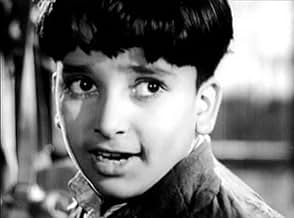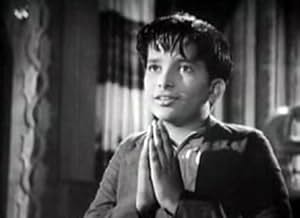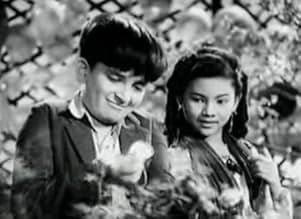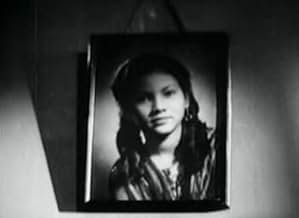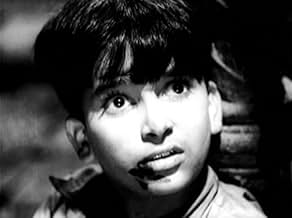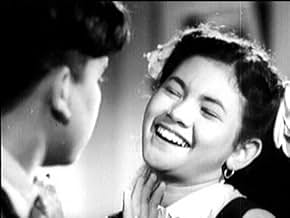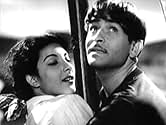NOTE IMDb
7,8/10
4,8 k
MA NOTE
Ajouter une intrigue dans votre langueA poor young man named Raj joins a criminal gang to feed his mother. But when he falls in love with Rita, he decides to reform himself for her.A poor young man named Raj joins a criminal gang to feed his mother. But when he falls in love with Rita, he decides to reform himself for her.A poor young man named Raj joins a criminal gang to feed his mother. But when he falls in love with Rita, he decides to reform himself for her.
- Réalisation
- Scénario
- Casting principal
- Récompenses
- 1 nomination au total
Prithviraj Kapoor
- Justice Raghunath
- (as Prithviraj)
Shashi Kapoor
- Young Raj
- (as Shashiraj)
Brij Mohan Vyas
- Dubey (Rita's Father)
- (as B.M. Vyas)
Leela Mishra
- Mr. Raghunath's Sister-In-Law
- (as Leela Misra)
Avis à la une
I saw it as a kid, sometime in 1957 or 1958. I was marveled and for a long time the movie remained in my heart. I was humming the Awaara Hum all the time, I was imagining myself as Raj, I was thinking at Rita. I started to consider myself a grown up: after all also Raj started in the movie as a kid and became a grown up. I knew now his songs, I knew so all I needed to be a grown up.
Well, I was a kid; it seems that also grown ups were in love with Awara; someone told me of a respectable physician who had been seen hanging around and humming Awaara Hum.
And this was what was happening those times in Romania. And in Bulgaria. And in the Soviet Union. And in Turkey. Kids and grown ups were humming the songs, imagining themselves as Raj, unconditionally in love for Rita, kids considering themselves grown ups, grown ups behaving like kids.
The life of this movie was becoming a legend.
I watched again the movie, a couple of days ago, on TV. Of course it gave me an immense pleasure and I began (jokingly this time, while clearly happy) to sing Awaara Hum again.
Did I notice this time something that I had missed years ago? Well, this time I was able to examine the fascination conveyed by this movie, surrounding this movie. I was able to examine it, as I was now detached; long time ago I had been immersed in the fascinating universe of Awara.
I was able this time to observe that the fascination was not coming from the plot; it was from somewhere beyond. The actor playing the father of Raj was also in real life the father of Raj Kapoor. The same with the actor playing Raj as kid: he was the brother of Raj Kapoor. As for Nargis, the great actress playing Rita, she was in real life the great love of Raj Kapoor. And all the rest of the cast was infused with the chemistry among these guys: their reciprocal chemistry, their chemistry for the cinematic art.
I think at the secret of this movie: it has a secret, no doubt about. You see, in 1949 the Japanese Ozu had created Late Spring, followed by Early Summer in 1951, the same year Raj Kapoor created Awara; I consider Ozu one of the greatest masters of cinema; in 1956 the Indian Satyajit Ray would create Pather Panchali, which is maybe one of the most profound movies of all times; followed by Aparajito and then by The World of Apu. Well, Awara stands, courageously, in my preferences among the movies of these titans, and this because it has a secret of his own.
Many noted the Chaplinesque dimension of the tramp created by Raj Kapoor in Awara. And clearly Kapoor had Charlot in his mind: the same humorous courage to stand against all odds. But, it's not only Charlot in Awara; you feel there also the air of films noirs, while the romance, saturated with music, has a surrealist poetry.
And maybe here is where the secret lies: this movie was created with the pleasure for creating cinema; with the passion to succeed in bringing on the screen a perfectly popular movie. If you want to understand what Bollywood means, you should see this movie from 1951. A movie openly looking for popularity because made by someone in love for the people, someone loving to tell stories to enjoy the attendance. Awara has a clear social message, but, as someone has very well observed, it is not a popular movie made to convey the message, rather the opposite: the message serves to convey a popular movie.
Well, I was a kid; it seems that also grown ups were in love with Awara; someone told me of a respectable physician who had been seen hanging around and humming Awaara Hum.
And this was what was happening those times in Romania. And in Bulgaria. And in the Soviet Union. And in Turkey. Kids and grown ups were humming the songs, imagining themselves as Raj, unconditionally in love for Rita, kids considering themselves grown ups, grown ups behaving like kids.
The life of this movie was becoming a legend.
I watched again the movie, a couple of days ago, on TV. Of course it gave me an immense pleasure and I began (jokingly this time, while clearly happy) to sing Awaara Hum again.
Did I notice this time something that I had missed years ago? Well, this time I was able to examine the fascination conveyed by this movie, surrounding this movie. I was able to examine it, as I was now detached; long time ago I had been immersed in the fascinating universe of Awara.
I was able this time to observe that the fascination was not coming from the plot; it was from somewhere beyond. The actor playing the father of Raj was also in real life the father of Raj Kapoor. The same with the actor playing Raj as kid: he was the brother of Raj Kapoor. As for Nargis, the great actress playing Rita, she was in real life the great love of Raj Kapoor. And all the rest of the cast was infused with the chemistry among these guys: their reciprocal chemistry, their chemistry for the cinematic art.
I think at the secret of this movie: it has a secret, no doubt about. You see, in 1949 the Japanese Ozu had created Late Spring, followed by Early Summer in 1951, the same year Raj Kapoor created Awara; I consider Ozu one of the greatest masters of cinema; in 1956 the Indian Satyajit Ray would create Pather Panchali, which is maybe one of the most profound movies of all times; followed by Aparajito and then by The World of Apu. Well, Awara stands, courageously, in my preferences among the movies of these titans, and this because it has a secret of his own.
Many noted the Chaplinesque dimension of the tramp created by Raj Kapoor in Awara. And clearly Kapoor had Charlot in his mind: the same humorous courage to stand against all odds. But, it's not only Charlot in Awara; you feel there also the air of films noirs, while the romance, saturated with music, has a surrealist poetry.
And maybe here is where the secret lies: this movie was created with the pleasure for creating cinema; with the passion to succeed in bringing on the screen a perfectly popular movie. If you want to understand what Bollywood means, you should see this movie from 1951. A movie openly looking for popularity because made by someone in love for the people, someone loving to tell stories to enjoy the attendance. Awara has a clear social message, but, as someone has very well observed, it is not a popular movie made to convey the message, rather the opposite: the message serves to convey a popular movie.
Awaara is an inimitable classic of Indian cinema and, in my opinion, of cinema is general. The film is a commentary on the social and political climate of those years in India, but its relevance remains so palpably strong today it's almost unbelievably how visionary the makers of the films were. Awaara touches upon a host of themes, from gender inequality with references to Indian mythology (Ram's rejection of Sita in the Ramyana), as seen in the story of a woman accused of impurity due to abduction; and the whole age-old debate of nature vs. Nurture, which is a key issue in this film. And the film has a stance on all those matters, which are tackled with honesty and great criticism by the writers. Poverty, a frequent motif in many Kapoor films, is portrayed as the mother of all crimes, and ignorance is the mother of poverty.
But besides being a strong social dramedy with a message, Awaara is just a terrific film - incredible entertainment, a beautiful romantic musical, an affecting human story - the artistic and aesthetic value of which is hard to match or recreate. The camera work is stupendous, the B&W cinematography (Radhu Karmakar) does wonders to the unique narrative, as does the music (Shankar-Jaikeshan). These two ingredients are intertwined in the film's most spectacular and best-photographed part - a lengthy musical dream sequence - the first of its kind in Indian cinema and which captures the protagonist's state through symbolism and introduces both amazingly decorated, lavish sets and phenomenal songs, culminating in the wonderful "Ghar Aaya Mera Pardesi". I can't think of many cinematic moments of such extraordinary artistic and cinematographic merit.
And this is just another part of Awaara. Kapoor's direction is revolutionary in many ways - the ability to create a film which embraces all the possible ingredients of mainstream Hindi cinema and yet imbue it with an atmosphere of authenticity and meaning, much to the point of neo-realism at some points. Indeed, this is characteristic of almost all the films Kapoor made in collaboration with the legendary screenwriter K. A. Abbas - always resulting in a great combination of stylish entertainment and educative value. The dialogue in this film is exactly that, it is alternately realistic, poetic, melodramatic, humorous - and sometimes all at the same time. All of it exists in the film's climax, namely a court sequence where the protagonist sits in the defendant's stand. Ironically, the judge is his own estranged father. It is so often that the film tugs at the heartstrings.
Awaara rests on a truly electrifying chemistry between Raj Kapoor and Nargis. It's not just about the tension and the perceptibly passionate energy, it's about mutual comfort, affection and understanding. One scene between them, when she brands him "savage", is tough viewing but very revealing. This is perhaps Kapoor's best performance as an actor - unquestionably he is at his dashing and stylish best - often typically humorous and flamboyant, embraces the Chaplinesque tramp persona - but his inner turmoil, anger and rage are so tangibly powerful. As played by Nargis, one of the most luminous actresses I can imagine, Rita sees all of it - it's in her eyes and every gesture. Nargis shines in this performance, capturing every bit of her character's perceptive and compassionate nature and looking madly in love throughout (maybe she really was).
Kapoor's character actors are brilliant. Prithviraj Kapoor is excellent as the prejudiced father and judge Raghunath. He may be impressive in his stylish demeanor but his pathetic weakness more than helps create one of the uniquely flawed and grayish film characters of the time. Less complex obviously but still fantastic is K. N. Singh as Jagga, a vengeful criminal who is pretty much an archetypal villain but also the one some viewers might find more sympathy for compared to Raghunath. Leela Chitnis is brilliant in a heartbreaking performance as Raj's suffering and kind mother. It is her character I felt most for, and her story is the one I thought could have been even better explored. Awaara is a gem of Indian cinema, a film that is always a pleasure to watch and which Raj Kapoor will certainly be remembered for.
But besides being a strong social dramedy with a message, Awaara is just a terrific film - incredible entertainment, a beautiful romantic musical, an affecting human story - the artistic and aesthetic value of which is hard to match or recreate. The camera work is stupendous, the B&W cinematography (Radhu Karmakar) does wonders to the unique narrative, as does the music (Shankar-Jaikeshan). These two ingredients are intertwined in the film's most spectacular and best-photographed part - a lengthy musical dream sequence - the first of its kind in Indian cinema and which captures the protagonist's state through symbolism and introduces both amazingly decorated, lavish sets and phenomenal songs, culminating in the wonderful "Ghar Aaya Mera Pardesi". I can't think of many cinematic moments of such extraordinary artistic and cinematographic merit.
And this is just another part of Awaara. Kapoor's direction is revolutionary in many ways - the ability to create a film which embraces all the possible ingredients of mainstream Hindi cinema and yet imbue it with an atmosphere of authenticity and meaning, much to the point of neo-realism at some points. Indeed, this is characteristic of almost all the films Kapoor made in collaboration with the legendary screenwriter K. A. Abbas - always resulting in a great combination of stylish entertainment and educative value. The dialogue in this film is exactly that, it is alternately realistic, poetic, melodramatic, humorous - and sometimes all at the same time. All of it exists in the film's climax, namely a court sequence where the protagonist sits in the defendant's stand. Ironically, the judge is his own estranged father. It is so often that the film tugs at the heartstrings.
Awaara rests on a truly electrifying chemistry between Raj Kapoor and Nargis. It's not just about the tension and the perceptibly passionate energy, it's about mutual comfort, affection and understanding. One scene between them, when she brands him "savage", is tough viewing but very revealing. This is perhaps Kapoor's best performance as an actor - unquestionably he is at his dashing and stylish best - often typically humorous and flamboyant, embraces the Chaplinesque tramp persona - but his inner turmoil, anger and rage are so tangibly powerful. As played by Nargis, one of the most luminous actresses I can imagine, Rita sees all of it - it's in her eyes and every gesture. Nargis shines in this performance, capturing every bit of her character's perceptive and compassionate nature and looking madly in love throughout (maybe she really was).
Kapoor's character actors are brilliant. Prithviraj Kapoor is excellent as the prejudiced father and judge Raghunath. He may be impressive in his stylish demeanor but his pathetic weakness more than helps create one of the uniquely flawed and grayish film characters of the time. Less complex obviously but still fantastic is K. N. Singh as Jagga, a vengeful criminal who is pretty much an archetypal villain but also the one some viewers might find more sympathy for compared to Raghunath. Leela Chitnis is brilliant in a heartbreaking performance as Raj's suffering and kind mother. It is her character I felt most for, and her story is the one I thought could have been even better explored. Awaara is a gem of Indian cinema, a film that is always a pleasure to watch and which Raj Kapoor will certainly be remembered for.
I have always like watching movies. However, as time went by, I have only known of Hollywood, European, Japanese, and Filipino cinema.
When I learned that Awara is one of Time Magazine's Top 100, I got a copy. The movie called my attention because I haven't seen a Bollywood movie.
I watched Awara, and I was entertained. All the genre you can think of, you'll find it there. Name it: melodrama, action, comedy, romance, music, fantasy. Raj Kapoor craftily weaved them in the almost three hour-long classic.
Behind the melodrama is the social commentary. The conflict between a person versus the orthodox beliefs of the milieu is a recurring theme each of us face in everyday life. Pressures to adhere to the norm led the main character to his plight. Children growing up in squalid areas is an important issue tackled.
The musical sequences showed the movie's multi-faceted nature. It showed references to Chaplin, Rodgers/Hammerstein, and the like. Particularly amazing is the dream sequence in an east meets west setting. Elements of Hindu-Buddhist mythology are mingled with those of ancient Greco-Roman.
The eclectic experience solidified my belief that Bollywood is indeed a pillar of world cinema. I look forward to watching more.
When I learned that Awara is one of Time Magazine's Top 100, I got a copy. The movie called my attention because I haven't seen a Bollywood movie.
I watched Awara, and I was entertained. All the genre you can think of, you'll find it there. Name it: melodrama, action, comedy, romance, music, fantasy. Raj Kapoor craftily weaved them in the almost three hour-long classic.
Behind the melodrama is the social commentary. The conflict between a person versus the orthodox beliefs of the milieu is a recurring theme each of us face in everyday life. Pressures to adhere to the norm led the main character to his plight. Children growing up in squalid areas is an important issue tackled.
The musical sequences showed the movie's multi-faceted nature. It showed references to Chaplin, Rodgers/Hammerstein, and the like. Particularly amazing is the dream sequence in an east meets west setting. Elements of Hindu-Buddhist mythology are mingled with those of ancient Greco-Roman.
The eclectic experience solidified my belief that Bollywood is indeed a pillar of world cinema. I look forward to watching more.
in the East of Europe, under the Comunist regime, the Indian films have had a special status. as alternative to the Soviet movies and propaganda shows. but, in same measure, for the social message. clear . for romanticism and music and charm of actors and dramatic situations. but Awaara was more than a successful Indian film. it was, and remains, an epic. because it gives the right perspective about ordinary, every day situations. because it reminds the joy of life and the deep pain.because it is , like the childhood fairy tales, story of courage and self determination and love difficulties , sacrifice and happiness. because it is nice and bitter and translation in image of known situations. and, sure, for Raj Kapoor. in the East , the Indian film was an open window. Awaara was, for years, one of the most convincing examples.
Raj Kapoor directs and stars in this classic Bollywood drama, which looks at the complicated lives of a poor man (Kapoor) and a privileged woman (Nargis). In Hindi with English subtitles.
This is the fifth collaboration between the two leads and this is one film from Indian cinema that I absolutely loved from start to finish the first time and exactly the same result occurred on a re-watch.
Kapoor gives a very good performance starring as Raj Raghunath, the man who is about to have one big moment of truth in the courtroom after he kills a criminal. Preparing to take the case to court, he is backed by his lawyer Rita (Nargis), who also happens to be his long-lost love.
Kapoor suits his role very well and makes the most of the time he has on the screen, while Nargis offers really good support in her role as the woman who is strongly prepared to defend Raj in court.
Elsewhere, there are strong supporting performances to be had from Prithviraj Kapoor and Leela Chitnis in their respective roles as Judge Raghunath and Leela Raghunath. Judge is the man taking charge of the latest proceedings at the latest case in the courtroom, while Leela is the woman who is thrown out of the house as it is believed she is up to no good...
Keep an eye out for Shashi Kapoor who appears as the younger version of Raj.
The direction from Raj Kapoor is excellent because he allows the facial expressions to be seen to a strong effect throughout, as well as keeping a very good pace going from start to finish, while the script is very well written by Khwaja Ahmad Abbas as he makes the movie easy to follow.
The technical aspects that stand out best are the set, camera and music, because the set is decent to view throughout, while the camera makes good use of the locations and the music is enjoyable to listen to.
Overall, Awaara is one well-acted film which terrific performances from Raj Kapoor and Nargis and this is one film that can definitely keep you gripped. One of the best Bollywood movies to have been made in the year of this release.
This is the fifth collaboration between the two leads and this is one film from Indian cinema that I absolutely loved from start to finish the first time and exactly the same result occurred on a re-watch.
Kapoor gives a very good performance starring as Raj Raghunath, the man who is about to have one big moment of truth in the courtroom after he kills a criminal. Preparing to take the case to court, he is backed by his lawyer Rita (Nargis), who also happens to be his long-lost love.
Kapoor suits his role very well and makes the most of the time he has on the screen, while Nargis offers really good support in her role as the woman who is strongly prepared to defend Raj in court.
Elsewhere, there are strong supporting performances to be had from Prithviraj Kapoor and Leela Chitnis in their respective roles as Judge Raghunath and Leela Raghunath. Judge is the man taking charge of the latest proceedings at the latest case in the courtroom, while Leela is the woman who is thrown out of the house as it is believed she is up to no good...
Keep an eye out for Shashi Kapoor who appears as the younger version of Raj.
The direction from Raj Kapoor is excellent because he allows the facial expressions to be seen to a strong effect throughout, as well as keeping a very good pace going from start to finish, while the script is very well written by Khwaja Ahmad Abbas as he makes the movie easy to follow.
The technical aspects that stand out best are the set, camera and music, because the set is decent to view throughout, while the camera makes good use of the locations and the music is enjoyable to listen to.
Overall, Awaara is one well-acted film which terrific performances from Raj Kapoor and Nargis and this is one film that can definitely keep you gripped. One of the best Bollywood movies to have been made in the year of this release.
Le saviez-vous
- AnecdotesIn Awaara, there are three genaration of the Kapoor family in the film. There is Deewan Kapoor in the film, who was the grandfather of Raj Kapoor (father of pritviraj ) who plays the role of judge, who comes in the beggining of the film and in the end, then Raj Kapoor's father, Pritviraaj and also his young brother, Shashi Kapoor (junior raj kapoor ) were also in this film. As a filmaker this was Raj Kapoor, his third film. This film got very famous in Russia. In a outdoor scene of Raj with Nargis, in the background, the music of the song ' na mangu sona chandi' could be heard there, 20 years later this tune was used in a song of. Bobby.
- ConnexionsFeatured in Century of Cinema: 100 ans de cinéma: 100 ans de cinéma indien (1996)
- Bandes originalesAwara Hoon
Sung by Mukesh
Music composed by Shankarsingh Raghuwanshi and Jaikishan Dayabhai Panchal (as Shankar-Jaikishan)
Lyrics by Shailendra
Meilleurs choix
Connectez-vous pour évaluer et suivre la liste de favoris afin de recevoir des recommandations personnalisées
- How long is Awaara?Alimenté par Alexa
Détails
- Durée3 heures 13 minutes
- Couleur
- Rapport de forme
- 1.37 : 1
Contribuer à cette page
Suggérer une modification ou ajouter du contenu manquant



